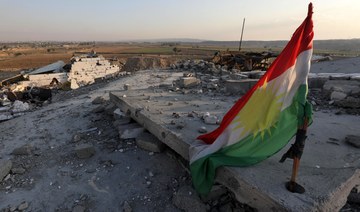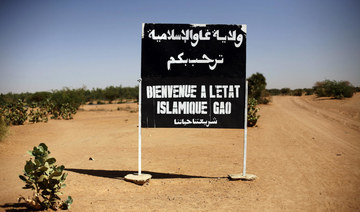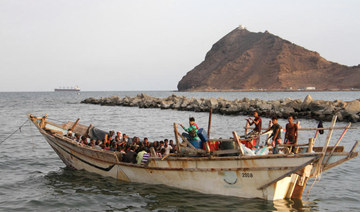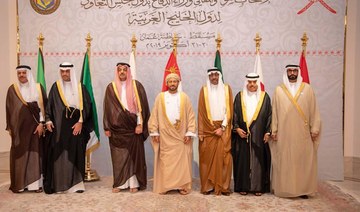BAGHDAD: Iraq has hanged three people convicted for a 2016 Baghdad bombing, claimed by the Daesh group, which killed more than 320 people, the prime minister’s office said on Monday.
The bombing was one of the world’s deadliest after the September 11, 2001 attacks on the United States.
At least 323 people were killed in the car bombing that sparked raging fires in Baghdad’s Karrada shopping area early on July 3, 2016 as it teemed with people ahead of the Eid Al-Fitr festival ending the Muslim holy month of Ramadan.
Prime Minister Mohammed Shia Al-Sudani, during a meeting with victims’ families, informed them “the rightful punishment of death sentence was carried out against three key criminals found guilty of their involvement in the terrorist bombing,” his office said in a statement.
It was one of the deadliest attacks to ever hit Iraq.
Police Major General Talib Khalil Rahi said at the time that the bomber’s minibus had been loaded with plastic explosives and ammonium nitrate.
The initial blast killed a limited number of people, but flames spread and trapped people inside shopping centers which lacked emergency exits, Rahi told a news conference a few days later.
The raging fires made it difficult to identify the dead.
Interior Minister Mohammed Ghabban resigned in the wake of the blast.
Daesh had overrun large areas north and west of Baghdad in 2014, but by the time of the Karrada blast Iraqi forces had regained significant territory from the extremists, who hit back against civilians in response.
Iraq’s government declared victory against the militants in late 2017 after a military campaign backed by a United States-led military coalition
In October 2021 Iraq announced the arrest outside the country of the person it said was the main suspect behind the Karrada blast. Then-prime minister Mustafa Al-Kadhemi said Ghazwan Alzawbaee was “the primary culprit” in that attack “and many others.”
The statement from Sudani’s office did not name those executed or say when they were sentenced. It said the executions were carried out Sunday night and Monday morning.
The United Nations estimated in a report in March that Daesh still has “5,000 to 7,000 members and supporters” across Iraq and neighboring Syria, “roughly half of whom are fighters.”
Daesh cells continue to target security forces and civilians in both countries but the UN report said the extremist organization had been much depleted by “sustained counter-terrorism operations” on both sides of the border.
Iraq hangs 3 for Daesh-claimed blast that killed hundreds
https://arab.news/8dcbz
Iraq hangs 3 for Daesh-claimed blast that killed hundreds
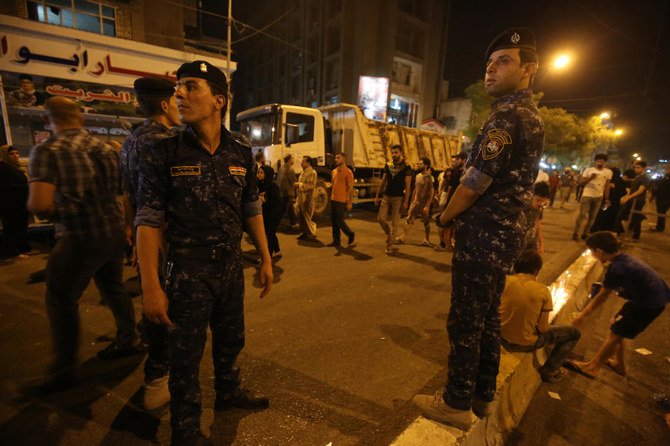
- At least 323 people were killed in the car bombing that sparked raging fires in Baghdad’s Karrada shopping area early on July 3, 2016
- It was one of the deadliest attacks to ever hit Iraq
Jordan hosts first meeting of regional project to improve response to nuclear emergencies

- Initiative seeks to bolster joint efforts, standardize practices to improve the efficiency of responses to crises
- Representatives of 27 countries attend opening day of 5-day meeting
AMMAN: The Jordan Atomic Energy Commission, in collaboration with the International Atomic Energy Agency, on Monday hosted the inaugural meeting of a regional initiative to improve preparedness for and responses to nuclear emergencies in Arab countries.
The project, “Strengthening and Harmonizing Regional Arab Cooperation and Coordination in Emergency Preparedness and Response,” seeks to bolster joint efforts and standardize practices to improve the efficiency of responses to crises, the Jordan News Agency reported.
Representatives of 27 countries, including Saudi Arabia, Bahrain, Egypt, Iraq, Kuwait, Lebanon, Libya, Mauritania, Palestine, Sudan, Syria, Tunisia and Yemen, joined officials from the IAEA, the Arab League, and the Arab Atomic Energy Agency at its first meeting.
The five-day event will include reviews of the project’s work plan, its implementation methods and joint activities as part of an Arab regional road map for the enhancement of national and regional capabilities for managing nuclear and radiological emergencies, harmonizing national frameworks, and establishing mechanisms for emergency situations across the region.
Khaled Toukan, the chairperson of JAEC, praised the IAEA for its efforts in organizing the meeting, and stressed the important role that exchanges of ideas, experiences and best practices can play in improving emergency preparedness and responses in Arab countries. He added that the Arab road map and its action plan represent vital frameworks for regional cooperation, with the support of the IAEA and the AAEA.
During the opening day, Iman bin Tahami, project management officer in the IAEA’s Technical Cooperation Department, outlined the 2024-2027 work plan for the project and its implementation strategy.
Mazna Assi, a specialist in nuclear and radiological emergency preparedness at the IAEA’s Incident and Emergency Center, said the Arab road map, developed on the recommendation of IAEA Director General Rafael Grossi, sets out the framework for establishing an effective regional emergency preparedness and response program.
Jordanian universities awarded $445,000 research grants in energy, healthcare

- Initiative aims to tackle challenges in development and sustainability
AMMAN: Seven Jordanian universities have been granted a total of £350,000 ($445,000) to support collaborative research projects in the fields of energy and healthcare, Jordan News Agency reported on Monday.
The funding comes from the Industrial Scientific Research and Development Fund under Jordan’s Higher Council for Science and Technology, in partnership with the British Royal Academy of Engineering.
The 2024 Transforming Systems through Partnership program has awarded each of the following universities a £50,000 grant: the Royal Scientific Society, Al-Balqa Applied University, Al Hussein Technical University, Hashemite University, Yarmouk University, Mutah University and Philadelphia University. These grants will facilitate joint research efforts with Cranfield University, De Montfort University, Coventry University, University College London, Aston University, Northumbria University and the University of Bath.
The initiative aims to tackle challenges in development and sustainability. Mashhour Refai, secretary-general of HCST, underscored the enduring partnership with the academy, highlighting the role of academia-industry collaboration in bolstering the national economy through applied scientific research.
Rima Ras, director of the fund, remarked on the program’s effect in enhancing the research and innovation capabilities of Jordanian universities and national institutions. She said that a panel of Jordanian and British experts reviewed 22 applications, ultimately selecting seven projects for funding.
This year’s program includes participation from Jordan, South Africa and Thailand. Since its inception, five rounds of the program have been conducted in Jordan in collaboration with the academy, supporting 34 projects with a total funding of more then £2 million.
Pentagon says Israel’s hostage operation did not involve Gaza pier

- The US military’s pier operations resumed briefly on Saturday after nearly two weeks offline
WASHINGTON DC: The Pentagon on Monday sought to dispel what it said were false perceptions on social media that Israel staged part of its hostage rescue operations on the US military’s floating pier off Gaza, saying that was not true and no US personnel were involved.
Still, Pentagon spokesperson Major General Patrick Ryder acknowledged there were Israeli helicopter operations “near” the pier, which was announced by US President Joe Biden as a way to bring desperately needed humanitarian aid to Palestinians.
“It was near but I think it’s incidental. Again, the pier, the equipment, the personnel all supporting that humanitarian effort had nothing to do with the IDF rescue operation,” Ryder said, referring to the Israel Defense Forces.
In a raid in Gaza on Saturday, Israeli forces rescued four hostages held by Hamas since October. In Saturday’s operation 274 Palestinians were killed, according to Gaza’s health ministry.
Ryder said the US military was trying to “push back on some of the inaccurate social media allegations” circulating about the pier.
“The humanitarian pier facility, including its equipment, personnel and assets, were not used in the IDF’s operation to rescue hostages in Gaza. And any such claim to the contrary is false.”
The US military’s pier operations resumed briefly on Saturday after nearly two weeks offline but have been halted against since Sunday due to bad weather. On Saturday, 492 metric tons of aid were delivered from the pier, the US military’s Central Command said.
The Israel-Hamas war has now entered its ninth month, since Hamas-led fighters killed 1,200 people and took some 250 others hostage in a rampage through southern Israel, according to Israeli tallies. Israel’s assault on the Gaza Strip has killed more than 37,000 Palestinians and reduced most of the enclave to wasteland, according to Gaza’s health ministry.
Any perception that the pier could be used by Israel militarily could undermine US efforts to increase the flow of aid to Palestinians and potentially increase the threat to US troops.
Ryder acknowledged misinformation and disinformation about what US troops were doing in the Middle East. But he dismissed the idea that the current misperceptions that the pier was used by Israel increased the threat to US forces, who have air defenses installed to shield them from possible rocket attack.
“No, I don’t think it puts our forces at greater risk,” he said, without explaining how he came to that conclusion.
38 migrants dead, 150 missing after shipwreck off Yemen’s Shabwa

- Fishermen spotted bodies floating in the sea and brought them ashore
- Coastal areas in Shabwa such as Al-Noshema are among the landing locations for thousands of African migrants
AL-MUKALLA: At least 38 African migrants, most of them women, have died after an overloaded boat capsized near the southern province of Shabwa in Yemen. More than 150 passengers are still missing.
An aid worker told Arab News that the migrants, including 28 women, perished after the vessel sank two nautical miles off the coast of Al-Noshema on Monday morning.
“Survivors informed us that the boat, carrying 260 migrants, sank owing to heavy winds,” said the Yemeni worker, who asked to remain anonymous, adding that 72 migrants had arrived safely at the shore.
Another relief worker who treated the survivors reported 48 people dead and 15 in a serious condition.
Images shared with Arab News show piled-up bodies being transported by vehicle to the grave.
According to Abdul Sallam bin Sama, a journalist from Shabwa, fishermen spotted the bodies floating in the sea and began hauling them to the beach. The dead were buried on Monday at Ain Bamabad.
Along with the Red Sea Ras Al-Ara in Lahj province, coastal areas in Shabwa such as Al-Noshema are among the landing locations for thousands of African migrants who arrive in Yemen each year.
Shabwa residents told Arab News that the number of those entering the province had increased significantly in recent months.
“They come in large numbers almost every day on the coast of Shabwa. Migrants who have money use a car to Attaq, whilst others who do not walk to the city,” said Omer Awadh, a Yemeni officer.
The International Organization for Migration said this year that the number of African migrants coming yearly had tripled from roughly 27,000 in 2021 to over 90,000 in 2023, despite the war in Yemen and recent Houthi assaults on ships in the Red Sea.
Meanwhile, US Central Command announced on Monday morning that a ballistic missile fired by the Houthis had damaged the Liberian-flagged, Swiss-owned and operated container ship M/V Tavvishi in the Gulf of Aden during the last 24 hours. A second missile was destroyed.
The Houthis launched two missiles at the M/V Norderney, an Antigua and Barbados-flagged cargo ship owned and managed by Germany, also in the Gulf of Aden, but the ship proceeded despite the damage.
US Central Command said its forces destroyed a drone launched by the Houthis from Yemen, as well as two land attack cruise missiles and one missile launcher in Houthi-controlled Yemeni territory.
The Houthis claimed on Sunday they had attacked the M/V Tavvishi and the M/V Norderney for allegedly breaching a ban on sailing to Israel and vowed to continue targeting ships until Israel lifted its blockade of the Palestinian Gaza Strip.
The Houthis have seized one commercial ship, sunk another, and launched hundreds of ballistic missiles and drones at international commercial and navy ships in the international sea lanes off Yemen since November last year.
Late Daesh chief Al-Baghdadi radicalized by US torture: Wife

- He ‘became short-tempered’ after release, developed ‘psychological problems’ due to ‘sexual torture’
- He was detained for a year in Camp Bucca after forming militia to fight American, allied forces in Iraq
LONDON: The late Daesh leader Abu Bakr Al-Baghdadi may have been subjected to “sexual torture” while in US custody in 2004, his widow has said.
Umm Hudaifa, who is in an Iraqi jail being investigated for her ties to Daesh, told the BBC that her husband had been “religious but not extremist,” and “conservative but open minded.”
Under Al-Baghdadi, Daesh committed genocide against the Yazidi people, in addition to hostage-taking, enslavement, and massacres of Muslim civilians in areas under its control.
Umm Hudaifa said his personality shifted after a year-long detention in Camp Bucca after he formed a militia to fight US and allied occupation forces in Iraq, during which time he told her that he was subjected to something “you cannot understand.”
She said he “became short-tempered and given to outbursts of anger” upon his release, and he developed “psychological problems,” which she believes were the consequences of “sexual torture.”
Al-Baghdadi, believed to have been born in the Iraqi city of Samarra in 1971, declared a global caliphate in 2014 from a mosque in Mosul after Daesh captured the city.
His claim was almost universally rejected by Muslims worldwide, and he was killed by US forces in Syria in October 2019.
Umm Hudaifa is being investigated for her role in the sexual enslavement of predominantly Yazidi women kidnapped by Daesh fighters, which she denies.
She has described the actions of Daesh as “inhumane,” and said she confronted Al-Baghdadi about the deaths of “innocent people” on his watch.
Hamid Yazidi and his niece Soad are bringing a civil case against Umm Hudaifa. Yazidi’s two wives and 26 children were allegedly taken by Daesh from their home in Sinjar, along with his two brothers and their extended families, including Soad, who was trafficked seven times by the group. Six of Yazidi’s children have never been recovered.
“She was responsible for everything,” Soad told the BBC. “She made the selections — this one to serve her, that one to serve her husband ... and my sister was one of those girls.”



